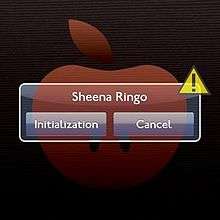Jiyū e Michizure
| "Jiyū e Michizure" | ||||
|---|---|---|---|---|
 | ||||
| Single by Ringo Sheena | ||||
| from the album Hi Izuru Tokoro | ||||
| Released | May 16, 2012 | |||
| Format | Digital single | |||
| Genre | Pop-rock | |||
| Length | 3:33 | |||
| Label | EMI Music Japan | |||
| Songwriter(s) | Ringo Sheena | |||
| Ringo Sheena singles chronology | ||||
| ||||
| Music video | ||||
| "Jiyū e Michizure" at YouTube | ||||
"Jiyū e Michizure" (自由へ道連れ, "Traveling Companion to Freedom") (official English title: Collateral Damage) is Japanese singer-songwriter Ringo Sheena's digital single (the 17th single overall), released on May 16, 2012. The song is featured as the theme song for the Japanese television drama Ataru.[1] "Jiyū e Michizure" reached number one in iTunes Store charts, peaked at 5 on the Japan Hot 100,[2] and at 7 on the RIAJ Digital Track Chart.[3] It was certified gold for 100,000 copies downloaded to computers in 2013.[4]
Sheena wrote the song at the request of the TV program's staff.
Music video
The music video for "Jiyū e Michizure" was directed by Yasuyuki Ozeki. Sheena didn’t appear on the music video, and Nana Komatsu starred in the video instead.
Track listing
| No. | Title | Writer(s) | Length |
|---|---|---|---|
| 1. | "Jiyū e Michizure" | Ringo Sheena | 3:33 |
Chart rankings
| Charts (2012) | Peak position |
|---|---|
| Japan Billboard Adult Contemporary Airplay[5] | 7 |
| Japan Billboard Japan Hot 100[6] | 5 |
| Japan RIAJ Digital Track Chart[7] | 7 |
Certifications
| Chart | Amount |
|---|---|
| RIAJ PC download certification[4] | Gold (100,000) |
Personnel
Personnel details were sourced from Hi Izuru Tokoro's liner notes booklet.[8]
- Hayashi (from Polysics) – guitars
- Satoshi Ishihara (from Going Under Ground) – bass guitar
- Makoto Sakurai (from Dragon Ash) – drums
- Ringo Sheena – arrangement, songwriting, vocals
Notes and references
- ↑ 椎名林檎、中居主演ドラマに主題歌「自由へ道連れ」提供 (in Japanese). Natalie. 2012-04-07. Retrieved 2012-06-24.
- ↑ "Billboard JAPAN Hot 100 シングルチャート" (in Japanese). Billboard JAPAN. 2012-05-28. Archived from the original on 2012-02-24. Retrieved 2012-06-24.
- ↑ "レコード協会調べ 2012年05月16日~2012年05月22日 <略称:レコ協チャート(「着うたフル(R)」)>" (in Japanese). RIAJ. 2012-05-22. Retrieved 2012-06-24.
- 1 2 レコード協会調べ 9月度有料音楽配信認定 [Record Association Investigation: September Digital Music Download Certifications]. RIAJ (in Japanese). October 18, 2013. Retrieved January 26, 2014.
- ↑ "Adult Contemporary Airplay 2011/05/28". Billboard (in Japanese). May 28, 2011. Retrieved May 3, 2014.
- ↑ "Japan Billboard Hot 100 2011/05/28". Billboard (in Japanese). May 28, 2011. Retrieved January 27, 2014.
- ↑ "レコード協会調べ 2012年05月16日~2012年05月22日 <略称:レコ協チャート(「着うたフル(R)」)>" [Record Association Investigation: May 16, 2009 to May 22, 2009 (For Short: Recokyō Chart (Chaku-uta Full))]. RIAJ (in Japanese). May 25, 2009. Archived from the original on May 3, 2014. Retrieved May 3, 2014.
- ↑ Hi Izuru Tokoro (Media notes) (in Japanese). Ringo Sheena. Tokyo, Japan: Universal Music Japan. 2015.